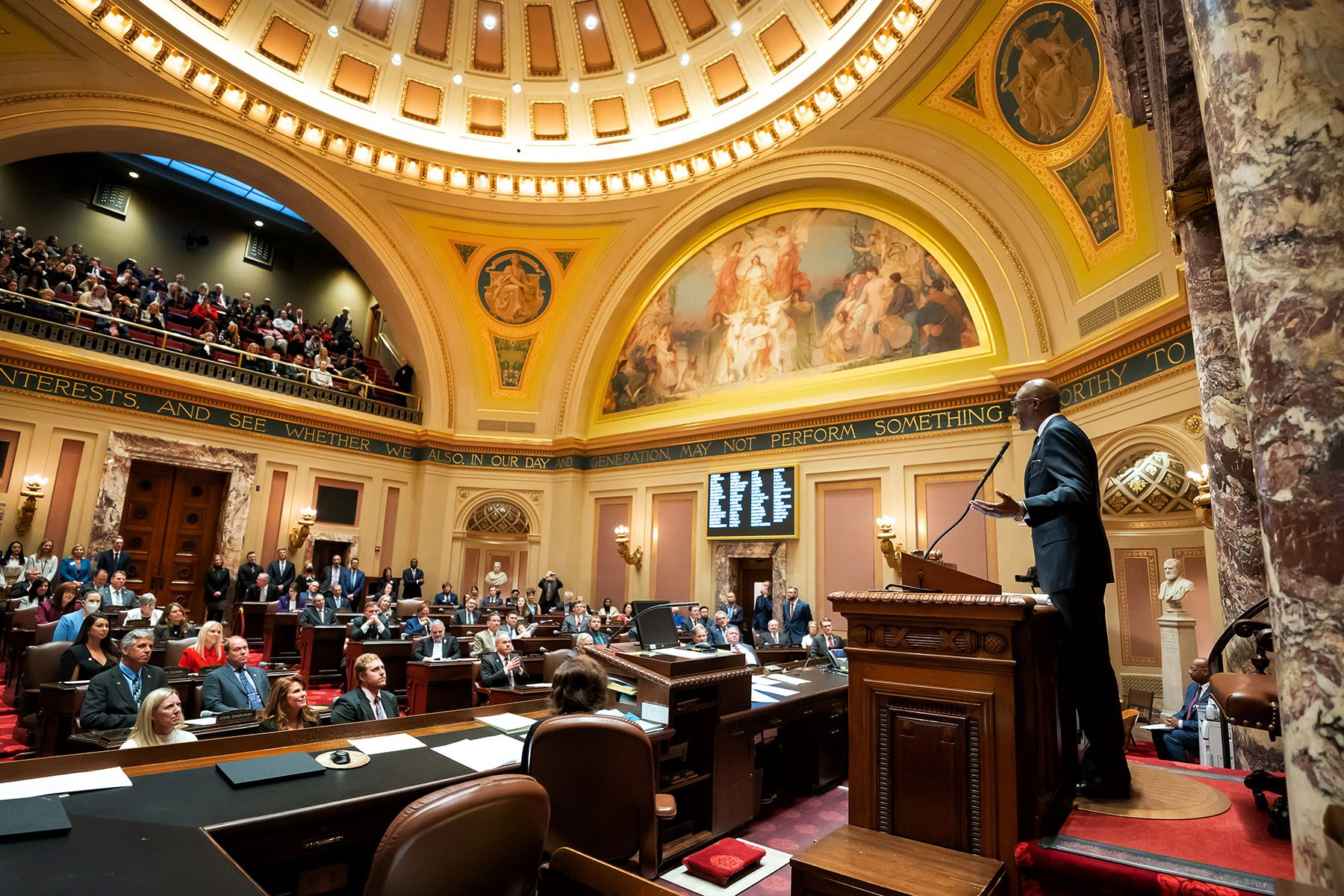We’re answering the “how” and “why” of abortion and politics news. Subscribe to our daily newsletter.
Democrats made big gains in key states in the 2022 midterms thanks to an electorate galvanized by abortion. Now, newly energized lawmakers in two of those states, Minnesota and Michigan, are putting their majorities to work to solidify access to abortion and reproductive care.
For years, divided government in the two battleground states barred Democrats from pursuing many of their policy priorities, including fortifying abortion rights. But Democrats secured complete control of state government in Michigan and Minnesota in the 2022 midterms after the Supreme Court overturned Roe v. Wade, reelecting Democratic governors while flipping control of chambers long held by Republicans. In both states, bills bolstering abortion access are at the top of their legislative agendas.
“Thanks to our historic victories last cycle, the new Democratic trifectas in states like Minnesota and Michigan are taking action on the issues that matter most to Americans,” Gabrielle Chew, a spokesperson for the Democratic Legislative Campaign Committee, said in a statement.
For Tim Stanley, executive director of Planned Parenthood Minnesota, North Dakota and South Dakota Action Fund, the results of the midterms represent a culmination of years of tireless work by advocates and a significant shift within the Democratic Party.
Michigan hasn’t had a Democratic trifecta since the 1980s. Minnesota Democrats have had control of state government in this century, but Stanley noted that the 2023 legislative session marks the first time that the legislature has been controlled by Democratic lawmakers who largely support abortion rights.
“When we had the 2012 election that brought us the 2013 trifecta, it was Democratic, and it passed marriage equality, which was a landmark achievement in and of itself,” he said. “But it was done with, at that point, an anti-choice majority in the House of Representatives.”
Minnesota Democrats prioritized the Protect Reproductive Options, or PRO Act, as the first bill introduced in both chambers of the legislature this session. Lawmakers are now working toward a speedy passage of the bill, which would formally codify the right to abortion — currently protected up to fetal viability by a Minnesota Supreme Court ruling — and other reproductive health care under state law.
“For the first time ever, abortion is the centerpiece of a legislative agenda. We’re House File 1 — the honor and the distinction that goes with being House File 1 just can’t be overstated,” Stanley said.
The law’s supporters are trying to get the legislation passed by both chambers and sent to Gov. Tim Walz for his signature by Sunday, the 50th anniversary of the Roe v. Wade decision, Minnesota Public Radio reported. And Democrats have, so far, been united behind the legislation at every step.
“That shows the resolve, in my book, to signal to the voters that we heard you and we are going to do everything we can do to solidify abortion rights in the state, just like you told us you wanted to be done,” Stanley said.
The bill, which passed out of committee along party lines and is due for a vote on the House floor Thursday, is opposed by Republicans and anti-abortion groups. Republican state Rep. Jim Nash criticized the measure as “overreaching” and “very extreme,” according to MPR.
Minnesota has become a crucial access point for abortions as neighboring states moved to ban the procedure after the fall of Roe v. Wade.
Claire McManus, a spokesperson for Planned Parenthood North Central States, said the region’s clinics providing abortions have seen a 13 percent increase in patients seeking abortions since the Supreme Court’s decision in Dobbs v. Jackson Women’s Health. The number of second-trimester abortions performed by clinics in the region has risen by 40 percent, she said, a result of patients having to travel farther and wait longer to obtain an abortion.
Ahead of the Dobbs decision, Planned Parenthood stopped providing abortions at its clinic in Sioux Falls, South Dakota, where abortion would be banned by a trigger law after its fall. North Dakota’s abortion ban remains on hold, but the state’s only remaining clinic, the independent Red River Women’s Clinic, moved its operations out of Fargo and across the border to the neighboring community of Moorhead, Minnesota.
In addition to the PRO Act, Minnesota lawmakers want to repeal several abortion restrictions, including parental notification requirements for minors and mandatory waiting periods, that lawmakers passed in the years following the Roe v. Wade decision. Many of those laws have been struck down by the courts but would make it even more difficult for out-of-state patients to access abortion care if enforced.
“We all believe in pendulum politics,” Stanley said. “There will be a time when we are not in the majority, and we have to make sure that if they’re going to impose new restrictions, and they have to start from scratch and re-pass them going through the process.”
Similarly, in Michigan, Democratic lawmakers who flipped both chambers of the state legislature in 2022 want to get old, unenforced laws dating back to 1931 that ban abortion procedures, medication abortion and contraception repealed and off the books for good. The 1931 abortion ban, which Michigan’s highest court blocked from taking effect in 2022, made it a felony offense to perform an abortion in most cases.
“The government does not belong in the exam room as people make private medical decisions,” Michigan House Speaker Pro Tempore Laurie Pohutsky, the bill’s sponsor, said in a statement. “We must repeal old laws that no longer reflect the will of Michigan voters.”
Michigan voters approved a new constitutional amendment guaranteeing the right to abortion and other forms of reproductive health care in the November midterms.
The future of abortion remains unclear in other nearby Midwestern states where abortion bans are also in legal limbo or lawmakers want to make abortion more difficult to access in their 2023 legislative sessions.
But Minnesota lawmakers passing the PRO Act and other measures expanding abortion access, Stanley said, would make Minnesota a “North Star” for reproductive care, fulfilling its state motto and making it a model he hopes other states follow.
“We will become the beacon of light in the upper Midwest,” he said. “And hopefully, the place where if you’re in Wisconsin, you start saying, ‘we need to become more like Minnesota.’”







